八大时态总结
(最新版)小学英语语法八大时态总结
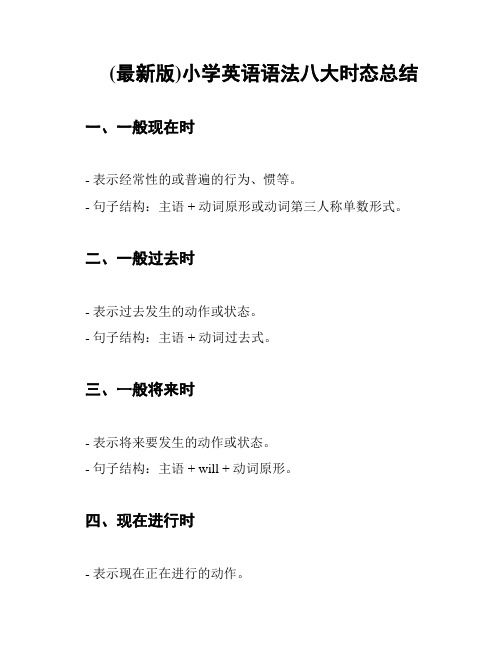
(最新版)小学英语语法八大时态总结一、一般现在时
- 表示经常性的或普遍的行为、惯等。
- 句子结构:主语 + 动词原形或动词第三人称单数形式。
二、一般过去时
- 表示过去发生的动作或状态。
- 句子结构:主语 + 动词过去式。
三、一般将来时
- 表示将来要发生的动作或状态。
- 句子结构:主语 + will + 动词原形。
四、现在进行时
- 表示现在正在进行的动作。
- 句子结构:主语 + am/is/are + 动词-ing。
五、过去进行时
- 表示过去某个时间正在进行的动作。
- 句子结构:主语 + was/were + 动词-ing。
六、将来进行时
- 表示将来某个时间正在进行的动作。
- 句子结构:主语 + will be + 动词-ing。
七、现在完成时
- 表示过去发生但与现在有关的动作或经历。
- 句子结构:主语 + have/has + 动词过去分词。
八、过去完成时
- 表示过去某个时间之前已经发生的动作。
- 句子结构:主语 + had + 动词过去分词。
以上是小学英语语法八大时态的总结,希望能对同学们的研究有所帮助。
英语八大时态总结表
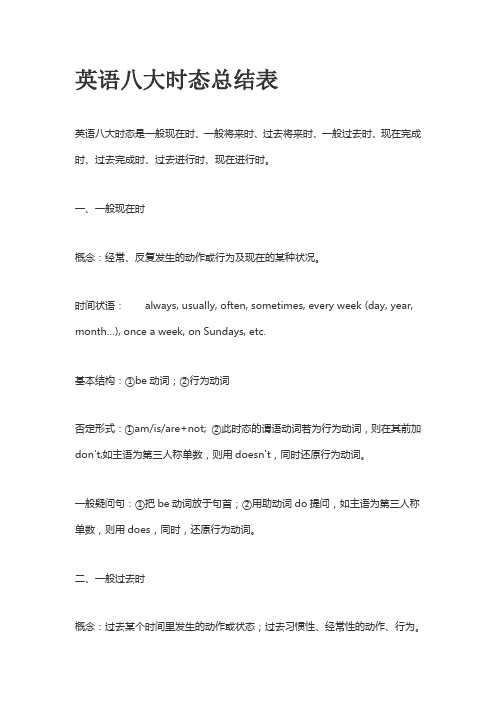
英语八大时态总结表英语八大时态是一般现在时、一般将来时、过去将来时、一般过去时、现在完成时、过去完成时、过去进行时、现在进行时。
一、一般现在时概念:经常、反复发生的动作或行为及现在的某种状况。
时间状语:always, usually, often, sometimes, every week (day, year, month…), once a week, on Sundays, etc.基本结构:①be动词;②行为动词否定形式:①am/is/are+not; ②此时态的谓语动词若为行为动词,则在其前加don't,如主语为第三人称单数,则用doesn't,同时还原行为动词。
一般疑问句:①把be动词放于句首;②用助动词do提问,如主语为第三人称单数,则用does,同时,还原行为动词。
二、一般过去时概念:过去某个时间里发生的动作或状态;过去习惯性、经常性的动作、行为。
时间状语:ago, yesterday, the day before yesterday, last week(year, night, month…), in 1989, just now, at the age of 5, one day, long long ago, once upon a time, etc.基本结构:①be动词;②行为动词否定形式:①was/were+not;②在行为动词前加didn't,同时还原行为动词。
一般疑问句:①was或were放于句首;②用助动词do的过去式did提问,同时还原行为动词。
三、现在进行时概念:表示现阶段或说话时正在进行的动作及行为。
时间状语:now, at this time, these days, etc.基本结构:am/is/are+doing否定形式:am/is/are+not+doing.一般疑问句:把be动词放于句首。
四、过去进行时概念:表示过去某段时间或某一时刻正在发生或进行的行为或动作。
英语八大时态总结
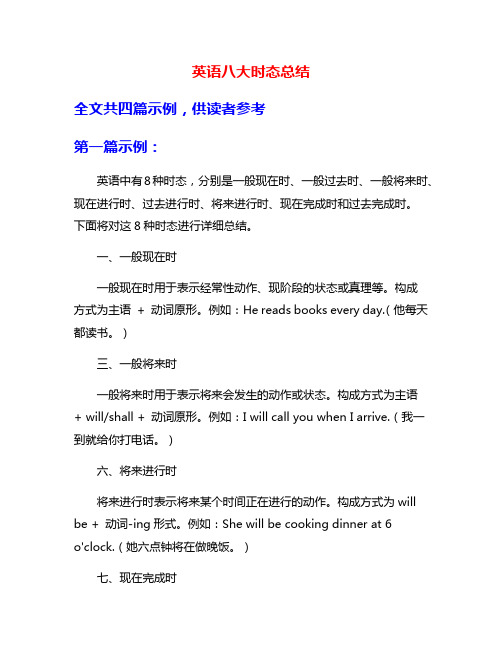
英语八大时态总结全文共四篇示例,供读者参考第一篇示例:英语中有8种时态,分别是一般现在时、一般过去时、一般将来时、现在进行时、过去进行时、将来进行时、现在完成时和过去完成时。
下面将对这8种时态进行详细总结。
一、一般现在时一般现在时用于表示经常性动作、现阶段的状态或真理等。
构成方式为主语+ 动词原形。
例如:He reads books every day.(他每天都读书。
)三、一般将来时一般将来时用于表示将来会发生的动作或状态。
构成方式为主语+ will/shall + 动词原形。
例如:I will call you when I arrive.(我一到就给你打电话。
)六、将来进行时将来进行时表示将来某个时间正在进行的动作。
构成方式为will be + 动词-ing形式。
例如:She will be cooking dinner at 6o'clock.(她六点钟将在做晚饭。
)七、现在完成时现在完成时用于表示过去某个时间开始的动作一直持续到现在,并可能继续发生。
构成方式为主语+ have/has + 过去分词。
例如:He has lived here for 5 years.(他在这里住了5年了。
)总结:1. 一般现在时表示经常性动作、现阶段的状态或真理。
2. 一般过去时表示过去某个时间发生的动作或状态。
3. 一般将来时表示将来会发生的动作或状态。
4. 现在进行时表示现在进行的动作或状态。
5. 过去进行时表示过去某个时间正在进行的动作。
6. 将来进行时表示将来某个时间将会进行的动作。
7. 现在完成时表示过去某个时间开始的动作一直持续到现在。
8. 过去完成时表示过去某个时间之前发生的动作。
掌握这8种时态的用法及构成方式对于学习英语语法和提高英语水平非常重要。
希望以上总结对您有所帮助。
第二篇示例:英语八大时态是学习英语语法非常重要的内容之一,掌握好各种时态的用法可以帮助我们更准确地表达自己的意思。
英语里的八大时态
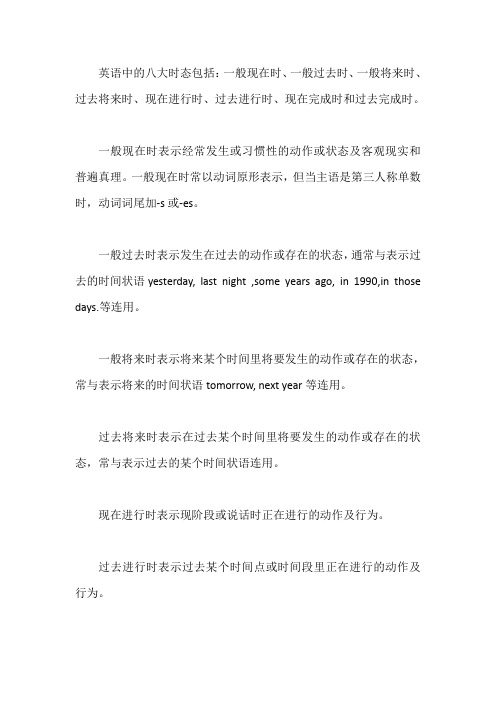
英语中的八大时态包括:一般现在时、一般过去时、一般将来时、过去将来时、现在进行时、过去进行时、现在完成时和过去完成时。
一般现在时表示经常发生或习惯性的动作或状态及客观现实和普遍真理。
一般现在时常以动词原形表示,但当主语是第三人称单数时,动词词尾加-s或-es。
一般过去时表示发生在过去的动作或存在的状态,通常与表示过去的时间状语yesterday, last night ,some years ago, in 1990,in those days.等连用。
一般将来时表示将来某个时间里将要发生的动作或存在的状态,常与表示将来的时间状语tomorrow, next year等连用。
过去将来时表示在过去某个时间里将要发生的动作或存在的状态,常与表示过去的某个时间状语连用。
现在进行时表示现阶段或说话时正在进行的动作及行为。
过去进行时表示过去某个时间点或时间段里正在进行的动作及行为。
现在完成时表示过去发生的动作对现在的影响,或者过去的动作一直持续到现在。
过去完成时表示过去的某个时间点之前已经完成的动作或存在的状态。
英语八大时态总结表

英语八大时态总结表英语时态是英语语法的重要组成部分,对于英语学习者而言,掌握八大时态非常必要,因为它们能够帮助我们表达过去、现在和未来的情况和状态。
在本文中,我将为大家总结八大时态的构成、用法和例句,以便更好地理解和运用英语时态。
一、一般现在时态(Simple Present Tense)构成:主语 + 动词原形(动词第三人称单数加s或es)用法:表示客观事实、普遍真理、习惯或现在经常发生的动作、状态或感觉。
例句:1. I often play basketball on weekends.(我经常在周末打篮球。
)2. Water boils at 100 degrees Celsius.(水在100度时沸腾。
)3. He speaks English fluently.(他讲英语很流利。
)二、一般过去时态(Simple Past Tense)构成:主语 + 动词过去式用法:表示过去的动作、状态或事件,常常和一段明确的过去时间连用。
例句:1. I walked to school yesterday.(昨天我走路去学校了。
)2. He studied hard for the test last week.(上周他为考试努力学习。
)3. They didn't go to the party last night.(他们昨晚没有去聚会。
)三、一般将来时态(Simple Future Tense)构成:主语 + will + 动词原形用法:表示将来的动作、计划或意愿。
例句:1. I will take the bus to the airport tomorrow.(明天我会坐公交车去机场。
)2. He will graduate from college next year.(他明年会从大学毕业。
)3. They will have a meeting at 2 pm.(他们会在下午两点开会。
英语八大时态总结
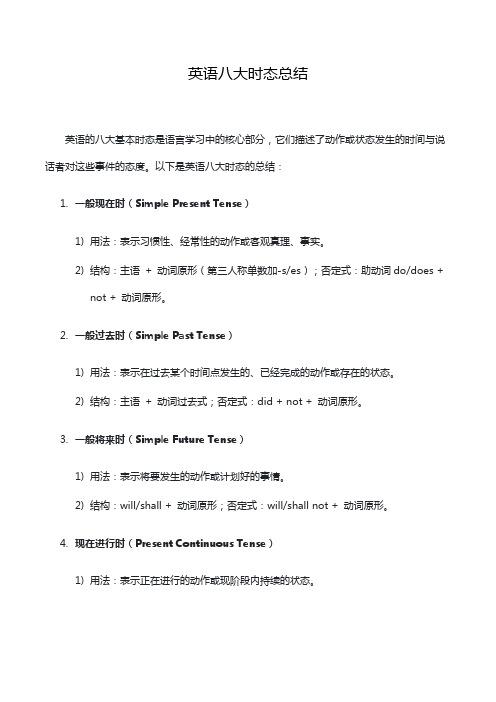
英语八大时态总结英语的八大基本时态是语言学习中的核心部分,它们描述了动作或状态发生的时间与说话者对这些事件的态度。
以下是英语八大时态的总结:1.一般现在时(Simple Present Tense)1)用法:表示习惯性、经常性的动作或客观真理、事实。
2)结构:主语+ 动词原形(第三人称单数加-s/es);否定式:助动词do/does +not + 动词原形。
2.一般过去时(Simple Past Tense)1)用法:表示在过去某个时间点发生的、已经完成的动作或存在的状态。
2)结构:主语+ 动词过去式;否定式:did + not + 动词原形。
3.一般将来时(Simple Future Tense)1)用法:表示将要发生的动作或计划好的事情。
2)结构:will/shall + 动词原形;否定式:will/shall not + 动词原形。
4.现在进行时(Present Continuous Tense)1)用法:表示正在进行的动作或现阶段内持续的状态。
2)结构:am/is/are + 动词-ing形式;否定式:am/is/are + not + 动词-ing形式。
5.过去进行时(Past Continuous Tense)1)用法:表示过去某段时间内正在进行的动作或背景。
2)结构:was/were + 动词-ing形式;否定式:was/were + not + 动词-ing形式。
6.现在完成时(Present Perfect Tense)1)用法:表示过去发生的动作对现在的影响或从过去一直持续到现在的情况。
2)结构:have/has + 过去分词;否定式:have/has + not + 过去分词。
7.过去完成时(Past Perfect Tense)1)用法:表示在过去的某一时间之前已经完成的动作。
2)结构:had + 过去分词;否定式:had + not + 过去分词。
8.将来完成时(Future Perfect Tense)1)用法:表示在将来某一时刻之前将要完成的动作。
英语中八大时态
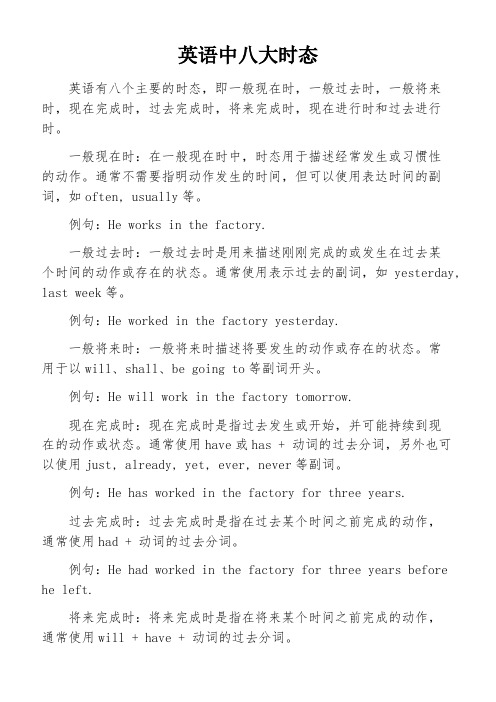
英语中八大时态英语有八个主要的时态,即一般现在时,一般过去时,一般将来时,现在完成时,过去完成时,将来完成时,现在进行时和过去进行时。
一般现在时:在一般现在时中,时态用于描述经常发生或习惯性的动作。
通常不需要指明动作发生的时间,但可以使用表达时间的副词,如often, usually等。
例句:He works in the factory.一般过去时:一般过去时是用来描述刚刚完成的或发生在过去某个时间的动作或存在的状态。
通常使用表示过去的副词,如yesterday, last week等。
例句:He worked in the factory yesterday.一般将来时:一般将来时描述将要发生的动作或存在的状态。
常用于以will、shall、be going to等副词开头。
例句:He will work in the factory tomorrow.现在完成时:现在完成时是指过去发生或开始,并可能持续到现在的动作或状态。
通常使用have或has + 动词的过去分词,另外也可以使用just, already, yet, ever, never等副词。
例句:He has worked in the factory for three years.过去完成时:过去完成时是指在过去某个时间之前完成的动作,通常使用had + 动词的过去分词。
例句:He had worked in the factory for three years before he left.将来完成时:将来完成时是指在将来某个时间之前完成的动作,通常使用will + have + 动词的过去分词。
例句:He will have worked in the factory for three years by the time he leaves.现在进行时:现在进行时是指正在发生的动作或状态,通常使用am/is/are + 动词的现在分词。
英语八大时态应用总结一览表

英语八大时态应用总结一览表一般现在时 (Simple Present Tense)- 描述常规或惯性动作:- I eat breakfast every day.(我每天都吃早餐。
)- 表达真理或普遍事实:- The sun rises in the east.(太阳从东方升起。
)现在进行时 (Present Continuous Tense)- 表示当前正在进行的动作:- I am studying for my exam.(我正在为考试而研究。
)- 表示暂时的行为或状况:- She is staying at a hotel while her house is being renovated.(她的房子在装修期间暂住在一家酒店。
)一般过去时 (Simple Past Tense)- 描述过去发生的具体事件:- I visited my grandparents last weekend.(上周末我去拜访了我的祖父母。
)- 表达过去的惯或状态:- She used to live in New York.(她过去住在纽约。
)过去进行时 (Past Continuous Tense)- 表示过去某一时刻正在进行的动作:- They were having dinner when the phone rang.(电话响起时,他们正在吃晚饭。
)- 表示过去某一时刻的背景情况:- I was reading a book while it was raining outside.(外面正在下雨时,我正在读书。
)一般将来时 (Simple Future Tense)- 表示将来发生的动作或事件:- We will have a meeting tomorrow.(我们明天将开会。
)- 表示预测或假设:- I think it will rain later.(我认为天会下雨。
)将来进行时 (Future Continuous Tense)- 表示将来某一时刻正在进行的动作:- They will be traveling to Europe this time next year.(明年这个时候,他们将在欧洲旅行。
八种时态归纳总结
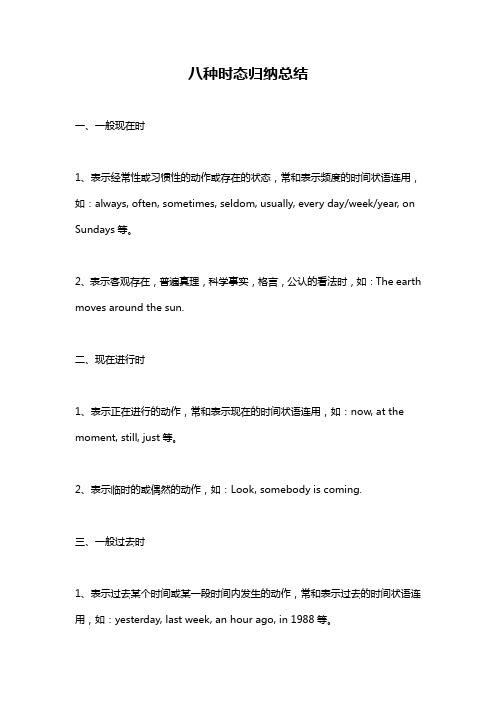
八种时态归纳总结一、一般现在时1、表示经常性或习惯性的动作或存在的状态,常和表示频度的时间状语连用,如:always, often, sometimes, seldom, usually, every day/week/year, on Sundays等。
2、表示客观存在,普遍真理,科学事实,格言,公认的看法时,如:The earth moves around the sun.二、现在进行时1、表示正在进行的动作,常和表示现在的时间状语连用,如:now, at the moment, still, just等。
2、表示临时的或偶然的动作,如:Look, somebody is coming.三、一般过去时1、表示过去某个时间或某一段时间内发生的动作,常和表示过去的时间状语连用,如:yesterday, last week, an hour ago, in 1988等。
2、表示过去经常性或习惯性的动作,如:He used to get up at 6:00 every morning.四、过去进行时表示过去某一时刻正在进行的动作,常和表示过去的时间状语连用,如:at that time, when I was a child等。
五、将来时1、表示将来某一时刻或某一段时间内发生的动作,常和表示将来的时间状语连用,如:tomorrow, next week, in two days, in June等。
2、表示将来经常性或习惯性的动作,如:He will go to work by bus every day.六、将来进行时表示将来某一时刻正在进行的动作,常和表示将来的时间状语连用,如:At that time tomorrow, next week, a month later等。
七、完成时1、表示过去发生的动作,此时此动作已经完成,常和表示过去的时间状语连用,如:yesterday, last week, in 1999等。
英语八大时态归纳总结
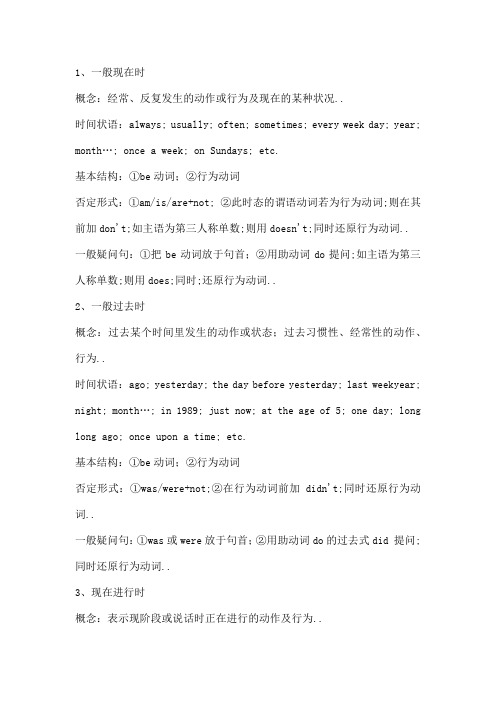
1、一般现在时概念:经常、反复发生的动作或行为及现在的某种状况..时间状语:always; usually; often; sometimes; every week day; year; month…; once a week; on Sundays; etc.基本结构:①be动词;②行为动词否定形式:①am/is/are+not; ②此时态的谓语动词若为行为动词;则在其前加don't;如主语为第三人称单数;则用doesn't;同时还原行为动词..一般疑问句:①把be动词放于句首;②用助动词do提问;如主语为第三人称单数;则用does;同时;还原行为动词..2、一般过去时概念:过去某个时间里发生的动作或状态;过去习惯性、经常性的动作、行为..时间状语:ago; yesterday; the day before yesterday; last weekyear; night; month…; in 1989; just now; at the age of 5; one day; long long ago; once upon a time; etc.基本结构:①be动词;②行为动词否定形式:①was/were+not;②在行为动词前加didn't;同时还原行为动词..一般疑问句:①was或were放于句首;②用助动词do的过去式did 提问;同时还原行为动词..3、现在进行时概念:表示现阶段或说话时正在进行的动作及行为..时间状语:now; at this time; these days; etc.基本结构:am/is/are+doing否定形式:am/is/are+not+doing.一般疑问句:把be动词放于句首..4、过去进行时概念:表示过去某段时间或某一时刻正在发生或进行的行为或动作..时间状语:at this time yesterday; at that time或以when引导的谓语动词是一般过去时的时间状语等..基本结构:was/were+doing否定形式:was/were + not + doing.一般疑问句:把was或were放于句首..5、现在完成时概念:过去发生或已经完成的动作对现在造成的影响或结果;或从过去已经开始;持续到现在的动作或状态..时间状语:recently; lately; since…for…;in the past few years; etc.基本结构:have/has + done否定形式:have/has + not +d one.一般疑问句:have或has..6、过去完成时概念:以过去某个时间为标准;在此以前发生的动作或行为;或在过去某动作之前完成的行为;即“过去的过去”..时间状语:before; by the end of last yearterm; month…;etc.基本结构:had + done.否定形式:had + not + done.一般疑问句:had放于句首..7、一般将来时概念:表示将要发生的动作或存在的状态及打算、计划或准备做某事..时间状语:tomorrow; next dayweek; month; year…;soon; in a few minutes; by…;the day after tomorrow; etc.基本结构:①am/is/are/going to + do;②will/shall + do.否定形式:①was/were + not; ②在行为动词前加didn't;同时还原行为动词..一般疑问句:①be放于句首;②will/shall提到句首..8、过去将来时概念:立足于过去某一时刻;从过去看将来;常用于宾语从句中..时间状语:the next daymorning; year…;the following monthweek…;etc.基本结构:①was/were/going to + do;②would/should + do.否定形式:①was/were/not + going to + do;②would/should + not + do.一般疑问句:①was或were放于句首;②would/should 提到句首..几种常见时态的相互转换英语中的几种时态在一定情况下可以互相转换;以下是几种常见的转换形式:1、一般过去时与现在完成时的转换在现在完成时中;延续性动词能与表示一段时间的状语连用;瞬间动词却不能..但是;可用别的表达方式:①瞬间动词用于“一段时间 + ago”的一般过去时的句型中;②瞬间动词可改成与之相对应的延续性动词及短语;与一段时间连用;③瞬间动词用于“It is + 一段时间 + since + 一般过去时”的句型中;表示“自从……以来有……时间”的意思;主句一般用it is来代替It has been;④瞬间动词用于“Some time has passed since + 一般过去时”的句型中..请看:A. He joined the League two years ago.B. He has been in the League for two years.C. It is two years since he joined the League.D. Two years has passed since he joined the League.2、一般现在时与现在进行时的转换在一般现在时中;at加上名词表示“处于某种状态”;如at work在工作; at school上学、上课等..此短语可与进行时态转换..请看:Peter is at work; but Mike is at play.Peter is working; but Mike is playing.3、现在进行时与一般将来时的转化换在现在进行时态中go; come; leave; start; arrive等动词常与表示将来的时间状语连用表示将要发生的动作..如:I am coming; Mum 意为“我就来;妈妈”请看:The train is leaving soon.The train will leave soon.4、“be going to+动词原形”与“willshall+动词原形”结构的转换“be going to+动词原形”、表示打算、计划要做的事;将来时“willshall+动词原形”结构在书面语中;当主语为第一人称时;常用助动词shall..在口语中;所有人称都可以用will..请看:We are going to visit the Great Wall next Sunday.We shall visit the Great Wall next Sunday.。
英语八大时态整理归纳
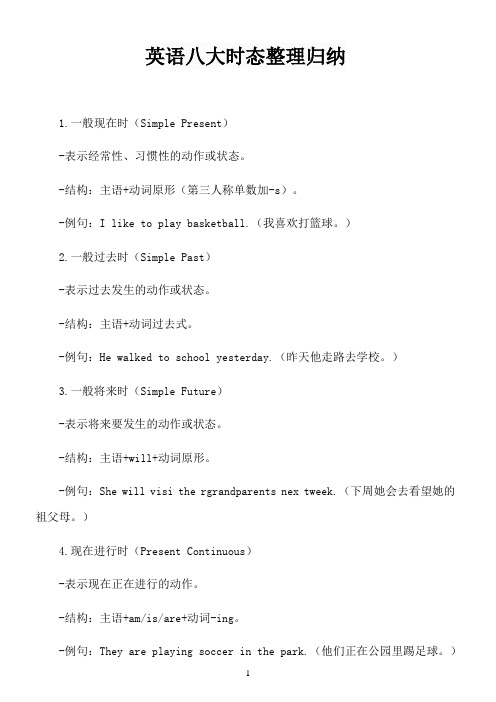
英语八大时态整理归纳1.一般现在时(Simple Present)-表示经常性、习惯性的动作或状态。
-结构:主语+动词原形(第三人称单数加-s)。
-例句:I like to play basketball.(我喜欢打篮球。
)2.一般过去时(Simple Past)-表示过去发生的动作或状态。
-结构:主语+动词过去式。
-例句:He walked to school yesterday.(昨天他走路去学校。
)3.一般将来时(Simple Future)-表示将来要发生的动作或状态。
-结构:主语+will+动词原形。
-例句:She will visi the rgrandparents nex tweek.(下周她会去看望她的祖父母。
)4.现在进行时(Present Continuous)-表示现在正在进行的动作。
-结构:主语+am/is/are+动词-ing。
-例句:They are playing soccer in the park.(他们正在公园里踢足球。
)5.过去进行时(Past Continuous)-表示过去某一时间正在进行的动作。
-结构:主语+was/were+动词-ing。
-例句:I was studying when she called me.(她给我打电话的时候,我正在学习。
)6.现在完成时(Present Perfect)-表示过去某个时间发生的动作对现在造成的影响。
-结构:主语+have/has+过去分词。
-例句:We have finished our homework.(我们已经完成了作业。
)7.过去完成时(Past Perfect)-表示过去某一时间之前已经发生的动作。
-结构:主语+had+过去分词。
-例句:He had already left when I arrived.(我到达时他已经离开了。
)8.将来完成时(Future Perfect)-表示将来某个时间之前已经完成的动作。
八大时态总结
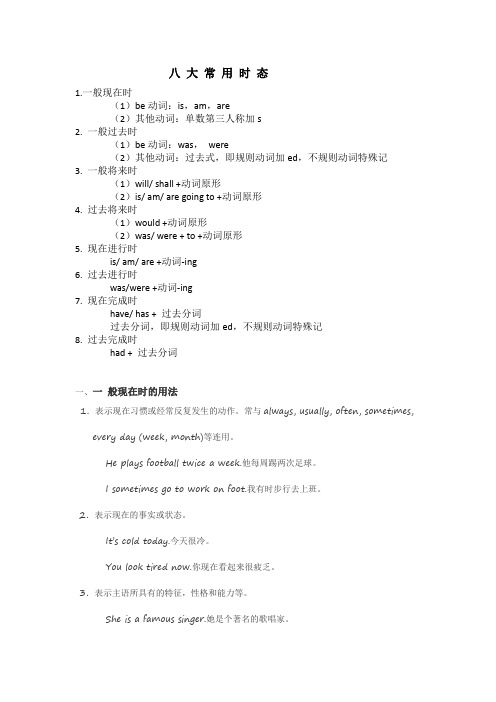
八大常用时态1.一般现在时(1)be动词:is,am,are(2)其他动词:单数第三人称加s2. 一般过去时(1)be动词:was,were(2)其他动词:过去式,即规则动词加ed,不规则动词特殊记3. 一般将来时(1)will/ shall +动词原形(2)is/ am/ are going to +动词原形4. 过去将来时(1)would +动词原形(2)was/ were + to +动词原形5. 现在进行时is/ am/ are +动词-ing6. 过去进行时was/were +动词-ing7. 现在完成时have/ has + 过去分词过去分词,即规则动词加ed,不规则动词特殊记8. 过去完成时had + 过去分词一、一般现在时的用法1.表示现在习惯或经常反复发生的动作。
常与always, usually, often, sometimes, every day (week, month)等连用。
He plays football twice a week.他每周踢两次足球。
I sometimes go to work on foot.我有时步行去上班。
2.表示现在的事实或状态。
It’s cold today.今天很冷。
You look tired now.你现在看起来很疲乏。
3.表示主语所具有的特征,性格和能力等。
She is a famous singer.她是个著名的歌唱家。
Tom likes swimming. 汤姆喜欢游泳。
4.表示客观事实或普遍真理。
I t’s far from the earth to the sun.地球与太阳间的距离很远。
Five and three makes eight.五加三得八。
5.表示已预先安排或计划好将来确定会发生的动作。
如列车时刻等。
但主要用于go, come, leave, start, return, arrive等瞬间动词。
The train from London arrives at 7:00.从伦敦来的火车7:00到站。
英语中八大时态

英语中八大时态
英语中有八种时态,分别是一般现在时、一般过去时、一般将来时、现在进行时、过去进行时、将来进行时、现在完成时和过去完成时。
以下是每种时态的基本用法和示例:
1. 一般现在时:表示经常性或习惯性的动作或状态。
例句:I usually go to bed at 10pm.
2. 一般过去时:表示过去某个时间发生的动作或状态。
例句:I went to London last year.
3. 一般将来时:表示将来某个时间要发生的动作或状态。
例句:I will study abroad next year.
4. 现在进行时:表示现在正在进行的动作。
例句:I am studying for my exam.
5. 过去进行时:表示过去某个时间正在进行的动作。
例句:I was watching TV when she called.
6. 将来进行时:表示将来某个时间正在进行的动作。
例句:I will be studying when you arrive.
7. 现在完成时:表示过去某个时间开始并一直持续到现在的动作或状态。
例句:I have lived in this city for five years.
8. 过去完成时:表示过去某个时间之前已经完成的动作或状态。
- 1 -。
英语八大时态基础知识总结
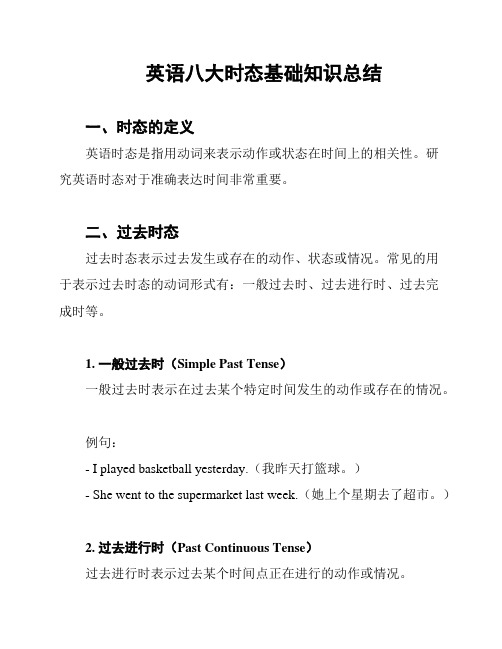
英语八大时态基础知识总结一、时态的定义英语时态是指用动词来表示动作或状态在时间上的相关性。
研究英语时态对于准确表达时间非常重要。
二、过去时态过去时态表示过去发生或存在的动作、状态或情况。
常见的用于表示过去时态的动词形式有:一般过去时、过去进行时、过去完成时等。
1. 一般过去时(Simple Past Tense)一般过去时表示在过去某个特定时间发生的动作或存在的情况。
例句:- I played basketball yesterday.(我昨天打篮球。
)- She went to the supermarket last week.(她上个星期去了超市。
)2. 过去进行时(Past Continuous Tense)过去进行时表示过去某个时间点正在进行的动作或情况。
例句:- They were studying English when I called them.(我打电话给他们的时候,他们正在研究英语。
)- He was sleeping when the guests arrived.(客人们到达时,他正在睡觉。
)3. 过去完成时(Past Perfect Tense)过去完成时表示过去某个时间点之前已经发生或完成的动作或情况。
例句:- I had already eaten dinner before she arrived.(她到达之前,我已经吃过晚饭了。
)- They had left the party when it started raining.(下雨开始时,他们已经离开了派对。
)三、现在时态现在时态表示现在正在发生的动作、存在的状态或普遍性的真理。
常见的用于表示现在时态的动词形式有:一般现在时、现在进行时、现在完成时等。
1. 一般现在时(Simple Present Tense)一般现在时表示经常性的动作、惯、客观真理或普通现象。
例句:- He often plays soccer on weekends.(他经常在周末踢足球。
英语语法八大时态总结 建议收藏
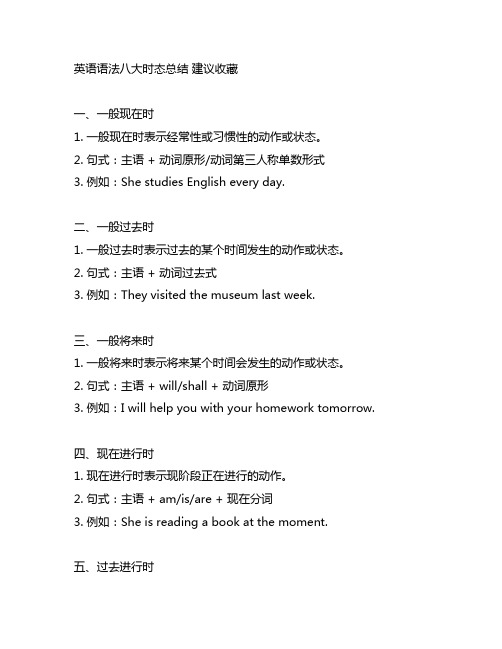
英语语法八大时态总结建议收藏一、一般现在时1. 一般现在时表示经常性或习惯性的动作或状态。
2. 句式:主语 + 动词原形/动词第三人称单数形式3. 例如:She studies English every day.二、一般过去时1. 一般过去时表示过去的某个时间发生的动作或状态。
2. 句式:主语 + 动词过去式3. 例如:They visited the museum last week.三、一般将来时1. 一般将来时表示将来某个时间会发生的动作或状态。
2. 句式:主语 + will/shall + 动词原形3. 例如:I will help you with your homework tomorrow.四、现在进行时1. 现在进行时表示现阶段正在进行的动作。
2. 句式:主语 + am/is/are + 现在分词3. 例如:She is reading a book at the moment.五、过去进行时1. 过去进行时表示过去某一时间正在进行的动作。
2. 句式:主语 + was/were + 现在分词3. 例如:They were playing football when it started to rain.六、现在完成时1. 现在完成时表示过去某个时间开始的动作一直持续到现在或对现在产生影响的动作。
2. 句式:主语 + have/has + 过去分词3. 例如:I have finished my homework.七、过去完成时1. 过去完成时表示在过去某个时间之前已经发生或完成的动作。
2. 句式:主语 + had + 过去分词3. 例如:She had already left when I arrived.八、将来完成时1. 将来完成时表示将来某个时间之前已经发生或完成的动作。
2. 句式:主语 + will/shall + have + 过去分词3. 例如:I will have completed the project by next month.总结回顾英语语法中的八大时态对于学习英语的人来说是十分重要的。
初中英语语法八大时态总结

1.一般现在时2 .一般过去时3 .一般将来时4 .现在进行时5 .过去进行时6 .现在完成时7 .过去完成时8 .过去将来时1.一般现在时1.一般现在时的构成一般现在时主要用动词原形表示,如果主语是第三人称单数则动词也要用第三人称单数形式。
动词第三人称单数的构成方式如下:构成方法例词一般在词尾加-s work—works;spend—spends在以s,z,ch,sh,x等字母结尾的动词之后加-es pass—passes;wash—washes;teach—teaches;mix—mixes以不发音的e结尾的动词只在e后加-s write—writes;ride—rides 以“辅音字母+y”结尾的动词,变y为i,再加-esstudy—studies;try—tries 以o结尾的动词,在词尾加-es do—does;go—goes2.一般现在时的用法(1)表示经常性或习惯性的动作或存在的状态,常与often,always,usually,sometimes,once a week,every day/...等表示频率的副词或时间状语连用。
如:I often go to school by bike.我经常骑车去上学。
(2)表示客观事实或普遍真理。
如:The earth goes around the sun.地球绕着太阳转。
(3)在时间、条件等状语从句中,用一般现在时表示将来。
如:If it rains tomorrow,we won't go to the park.如果明天下雨,我们将不去公园。
When I grow up,I will go to America.当我长大后,我将去美国。
即学即练( )1.If Nancy ________ the exam ,she will go to Australia for English study.A .passB .passedC .passesD .will pass ( )2.The Greens will visit Hainan as soon as they ________ to China.A .comesB .comeC .cameD .will come ( )3.Now my father ________ his bike to work every day instead of driv ing.A .rideB .rodeC .ridesD .will rideC B C2.一般过去时1.一般过去时的构成一般过去时用动词的过去式表示,即:主语+动词的过去式。
英语语法八大时态总结建议收藏

英语语法八大时态总结,建议收藏!英语8大时态总结英语语法一直都是英语学习的一项重点和难点,而在这其中时态无疑是英语学习最重要的语法内容,学好时态基本就拿下了语法的半壁江山。
今天,帮大家总结的八种时态是大家在英语学习中必学必考的,复习时一定要加倍重视哦!一般现在时1.概念:经常、反复发生的动作或行为及现在的某种状况。
2.基本结构:①is/am/are;②do/does.否定形式:①am/is/are+not;②此时态的谓语动词若为行为动词,则在其前加don t,如主语为第三人称单数,则用doesn t,同时还原行为动词。
3.一般疑问句:①把is/am/are动词放于句首;②用助动词do提问,如主语为第三人称单数,则用does,同时,还原行为动词。
4.用法(1)经常性或习惯性的动作,常与表示频度的时间状语连用。
例如:I leave home for school at7every morning.每天早上我七点离开家。
(2)客观真理,客观存在,科学事实。
例如:The earth moves around the sun.地球绕太阳转动。
Shanghai lies in the east of China.上海位于中国东部。
(3)表示格言或警句。
例如:Pride goes before a fall.骄者必败。
注意:此用法如果出现在宾语从句中,即使主句是过去时,从句谓语也要用一般现在时。
例如:Columbus proved that the earth is round.哥伦布证实了地球是圆的。
(4)现在时刻的状态、能力、性格、个性。
例如:I don t want so much.我不要那么多。
Ann writes good English but does not speak well.安英语写得不错,讲的可不行。
(5)一般现在时表示将来含义a.下列动词come,go,arrive,leave,start,begin,return的一般现在时可以表示将来,主要用来表示在时间上已确定或安排好的事情。
- 1、下载文档前请自行甄别文档内容的完整性,平台不提供额外的编辑、内容补充、找答案等附加服务。
- 2、"仅部分预览"的文档,不可在线预览部分如存在完整性等问题,可反馈申请退款(可完整预览的文档不适用该条件!)。
- 3、如文档侵犯您的权益,请联系客服反馈,我们会尽快为您处理(人工客服工作时间:9:00-18:30)。
动词的时态一般现在时1. --- Do you regret having left your first job?--- Why should I? I ____ as much, but I enjoy more of it.A. didn’t earnB. don’t earnC. hadn’t earnD. haven’t earned2. I’d rather you did some housework when you are free, but you ____.A. didn’tB. shouldn’tC. weren’tD. don’t3. I ____ ping-pong quite well, but I haven’t had time to play since the New Year.A. will playB. have playedC. playedD. play4. This machine ____. It hasn’t worked for years.A. didn’t workB. wasn’t workingC. doesn’t workD. isn’t working5. I need one more stamp before my collection ____.A. has completedB. completesC. is completedD. will be completed6. --- Why did you make the kite of cloth instead of paper?--- Because paper ____ easily.A. is tornB. will be tornC. tearsD. tore7. --- How do you find your MP3? --- ____.A. It works wellB. It was in good conditionC. I found it homeD. It is too expensive8. --- When are you going to the airport tomorrow?--- My plane ____ at 10:00a.m.so I will start out at 8:00 a.m.A. is leavingB. leavesC. will leaveD. is to leave答案:BDDCCCAB现在进行时1. As we all know, the teacher ____ for the small village to teach tomorrow.A. leaveB. is leavingC. has leftD. left2. --- ____ Mr. Smith ____ this week ?--- No. He is on holiday.A. Has; workedB. Does; workC. Did; workD. Is; working3. Today the number of people using cellphones ____ with the development of people’s living conditions A. increase B. is increasing C. has increased D. will increase4. You ____ things about. Look, your room is a real mess!A. always throwB. have always thrownC. are always throwingD. were always throwing5. On the wall ____ one map ____ dozens of pictures.A. hang; includingB. are hung; togetherC. is hanged; withD. is hanging; as well as 答案:BDBCD现在完成时1. The construction of the two new railway lines ____ by now.A. has been completedB. have been completedC. has completedD. have completed2. My friend, who ____ on the International Olympic Committee all his life, is retiring next month. A. served B. is serving C. had served D. has served3. Although medical science ____ control over several dangerous diseases, what worries us is that some of them are returning.A. achievedB. has achievedC. will achieveD. had achieved4. After having been friends for many years, they suddenly had a big argument and have never seen each other _____. A. since B. though C. ever D. either5. This is the first time that I ____ such an incredible thing.A. had heardB. have heardC. am hearingD. heard6. ---____ my bag? I put it here just now.--- A red one? I ____ it on the table but now it is gone.A. Have you seen; sawB. Have you seen; have seenC. Did you see; sawD. Do you see; have seen7. Years ago we didn’t know this, but recent science ____ that people who don’t sleep wellsoon get ill. A. showed B. has shown C. will show D. is showing8. In the past 49 years, the United States, Soviet Union and Japan ____ 123 moon explorationprograms. A. launched B. have launched C. had launched D. has launched答案:ADBABABB一般将来时1. If you ____ succeed, you should work hard.A. willB. are going toC. is about toD. are to2. You ____be twenty years old next year, so you should do things as an adult should.A. are going toB. willC. are about toD. are to3. If you go to Mary’s birthday party, so ____ I.A. doB. wouldC. shallD. am4. --- How could I apply for a course online?--- Just fill out this form and we ____ what we can do for you.A. seeB. are seeingC. have seenD. will see5. --- It seems you have been late for class more than once this week, Tom?--- My alarm clock ____ run because one of the parts is missing.A. won’tB. needn’tC. mustn’tD. wouldn’t6. --- Might I have an interview with you after the lecture tomorrow morning?--- Oh, maybe it will do after 10 o’clock, because we ____ a discussion between 9 o’clock and 10 o’clock. A. are to have B. are going to have C. will be having D. will have 7. The train which we are taking ____ at a speed of 280 kilometers per hour until it arrives in Beijing next morning. A. will run B. are running C. will have run D. will be running8. By the end of next year we _____ English for 8 years.A. will have studiedB. will studyC. are going to studyD. will be studying答案:DBCDACDA一般过去时1. My cousin went to Canada two years ago. He ____ there for a few months and then went to America. A. worked B. would work C. would be working D. has been working2. I ____ in London for many years, but I’ve never regretted my final decision to move back to China. A. lived B. was living C. have lived D. had lived3. James has been majoring in music in his homeland since he left Beijing, where he ____ Chinese for three years. A. studies B. was studying C. is studying D. studied4. --- What do you think of my speech? Being watched by so many people, I always feelnervous. --- You ____ it off quite well, though.A. carriedB. carryC. had carriedD. have carried5. You are doing in a wrong way. It ____ this way.A. used to doB. is used to doingC. used to be doneD. was used to doing6. Scientists think that the continents ____ always where they ____ today.A. aren’t; areB. aren’t; wereC. weren’t; areD. weren’t; were7. A group of middle schoolers ____ college students for a day recently and experienced the fun of learning when they toured Harvard University.A. has becomeB. had becomeC. becameD. become8. It is high time that you ____ to bed because it is too late.A. goB. wentC. are goingD. are to9. I would rather you ____ at home every night. I am worried about your safety.A. stayedB. had stayedC. would stayD. were staying10. --- Hello, Jim. I ___ to see you today. Sonia said you ____ ill. --- Oh, I’m OK.A. don’t expect; wereB. haven’t expected; areC. am not expecting; areD. didn’t expect; were11. --- Your telephone number again? I ____ quite catch it.--- It’s 9568442. A. didn’t B. couldn’t C. don’t D. can’t答案:AADACCCBAD过去进行时1. --- What were you doing when Tony phoned you?--- I had just finished my work and ____ to take a shower.A. had startedB. startedC. have startedD. was starting2. I ____ along the street looking for a place to park when the accident ____.A. went; was occurringB. went; occurredC. was going; occurredD. was going; had occurred3. Shirley ____ a book about China last year but I don’t know if she has finished it.A. has writtenB. wroteC. had writtenD. was writing4. --- Hey, look where you are going! --- Oh, I’m terribly sorry. _____.A. I’m not noticingB. I wasn’t noticingC.I haven’t noticedD. I don’t notice5. --- Why didn’t answer my phone when I called you last night?--- Oh, perhaps I ____ a bath then. A. had B. had had C. was having D. have had6. The last time I ____ Jane she ____ cotton in the fields.A. had seen; was pickingB. saw; pickedC. had seen; pickedD. saw; was picking7. --- I didn’t go to Mary’s party last night because my car broke down.--- You could have borrowed mine. I ____ it.A. hadn’t usedB. wasn’t usingC. didn’t useD. wouldn’t use答案:DCDBCDB过去完成时1. He ____ five novels by the end of last year.A. has finishedB. finishedC. had finishedD. was finishing2.Why he did not arrive on time was that he ____ and it was too late to catch the early bus.A. was oversleepingB. has oversleptC. oversleptD. had overslept3. I was giving a talk to a large group of people, the same talk I ____ to half a dozen othergroups. A. was giving B. am giving C. had given D. have given 4. --- Did Linda see the traffic accident?--- No, no sooner ____ than it happened.A. had she goneB. she had goneC. has she goneD. she has gone5. If only he ____ quietly as the doctor instructed, he would not suffer so much now.A. liesB. layC. had lainD. should lie答案:CDCAC。
